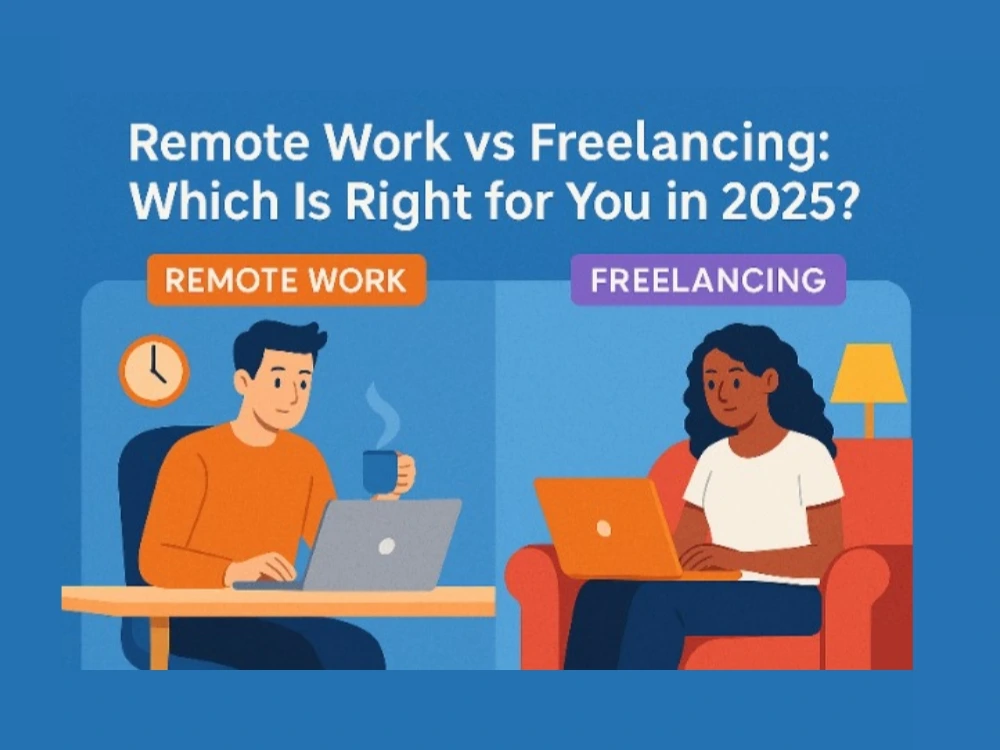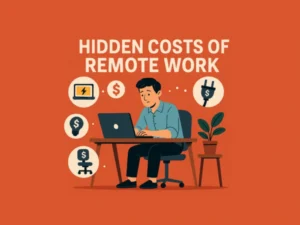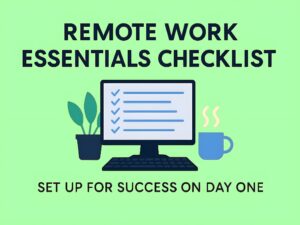Remote Work vs Freelancing: Which Is Right for You in 2025?
As we move deeper into the digital world, the distinction between different ways of working is dissolving more than ever. Of the most bewildering terms of 2025 is remote work versus freelancing. Both are not only offering freedom and adaptability but are fundamentally different in method, expectations, and lifestyle. In this all-encompassing guide, we are going to analyze everything that you need to know to help you make the most educated decision for your career.
Understanding Remote Work
Remote work refers to a work arrangement where an employee performs their duties outside a traditional office, usually from home or any other location with internet access. Unlike freelancing, remote workers are typically employed by a single company with fixed responsibilities, set hours, and often enjoy benefits like health insurance, paid leave, and job stability.
Pros of Remote Work
- Job security: You’re on a payroll, usually with benefits.
- Secure income: Weekly paycheck, which allows for budgeting.
- Collaboration support: You are part of a team with established roles and support.
- Personal development opportunities: Access to training, advancement, and mentorship programs.
Downsides to Remote Work
- Less flexibility in your schedule.
- KPIs and monitoring of your performance can be limiting.
- Less variety in the type of work you do.
Understanding Freelancing
Freelancers are self-employed professionals who work for multiple clients. Freelancers are free to work anywhere and handle several projects at the same time. Freelancing offers maximum freedom and variety but minimum stability and no traditional benefits.
Benefits of Freelancing
- Freedom of choice: Select the clients and projects that you want.
- Flexible schedule: Work at your best hours.
- Variety of opportunities: Get to work in different industries and types of work.
- Greater earning capacity: Bill per project, per hour, or value pricing.
Disadvantages of Freelancing
- Irregular income.
- No employer benefits.
- Have sole business operations on your shoulders (marketing, billing, taxation).
Remote Work vs Freelancing: Points of Difference
The determining factor of remote work vs freelancing is understanding how each influences your daily life and future goals. Let’s break it.
Remote Work vs Freelancing: Quick Comparison Table
| Aspect | Remote Work | Freelancing |
|---|---|---|
| Employment Status | Employee | Independent Contractor |
| Income | Fixed / Salaried | Variable / Project-Based |
| Schedule | Fixed | Flexible |
| Benefits | Usually provided | None / Self-managed |
| Work Variety | Limited | High |
Which One Pays More in 2025?
Both paths have six-figure opportunities in 2025. Freelancers who have high-demand skills like UX/UI design, copywriting, or AI automation can charge top dollar. However, skilled remote professionals in tech, project management, and consulting are also making six-figures. Want to know how to acquire high-paying freelance clients in 2025? Don’t miss our guide on it: High-Paying Freelance Clients in 2025.
Skills That Pay the Bills
Regardless of your path, there are certain skills that will be crucial in 2025:
- Time Management (read this guide to be a productivity master)
- AI Tools & Automation
- Digital Marketing
- Client Communication
- Self-Motivation & Discipline
Success Tools
Remote workers and freelancers alike need the right tech stack. Here are some tools that work well for both:
Check out our article on apps with secret money-making features — perfect for remote workers and freelancers alike: Hidden Money-Making Features in Apps.
How to Choose Between Remote Work vs Freelancing
If you prefer structure, regular pay, and extended assignments, remote work is for you. But if you desire flexibility, variety, and unlimited earning potential, freelancing is the option.
Ask yourself:
- Do I want job security or independence?
- Am I good at being my own boss and finding clients?
- How much risk do I feel comfortable with?
- Do I wish to create a personal brand?
Can You Do Both?
Yes. And in reality, many professionals in 2025 are embracing hybrid work. They have a part-time remote career for security and freelance on the side to build skills and income. This two-track strategy has the best of both worlds, and it’s increasing in industries.
Legal and Financial Considerations
If you’re going freelance, you’ll need to handle your own taxes, invoices, and possibly register a business. Remote workers usually have these handled by their employer. Freelancers should explore invoicing platforms like Wave or FreshBooks.
Remote Work vs Freelancing: The Final Verdict
There is no single approach in thinking about freelancing versus remote work. The best for you will depend on your personality, goals, abilities, and personal choices. You can always start with one and change later as circumstances dictate.
Need a kick-start? Our site EarnWithTools offers freelancing and remote work advice, tools, and strategies.
Conclusion
Choosing remote work over freelancing in 2025 is a choice that can influence your lifestyle, income, and professional growth. Gauge your risk tolerance and values, test tools, and get your feet wet. No matter what you choose, success is certainly attainable if you have the right resources and mindset.
Want to be more productive and land higher-paying freelance jobs? Start with our productivity tips and discover how to attract higher-paying freelance clients.
Subscribe to Our Newsletter
Receive exclusive productivity advice, AI tool recommendations, and remote working tips in your inbox. Subscribe to our free newsletter and stay ahead of the game in 2025!
If this guide has helped you, pass it on to your contacts and search for more resources at EarnWithTools.



